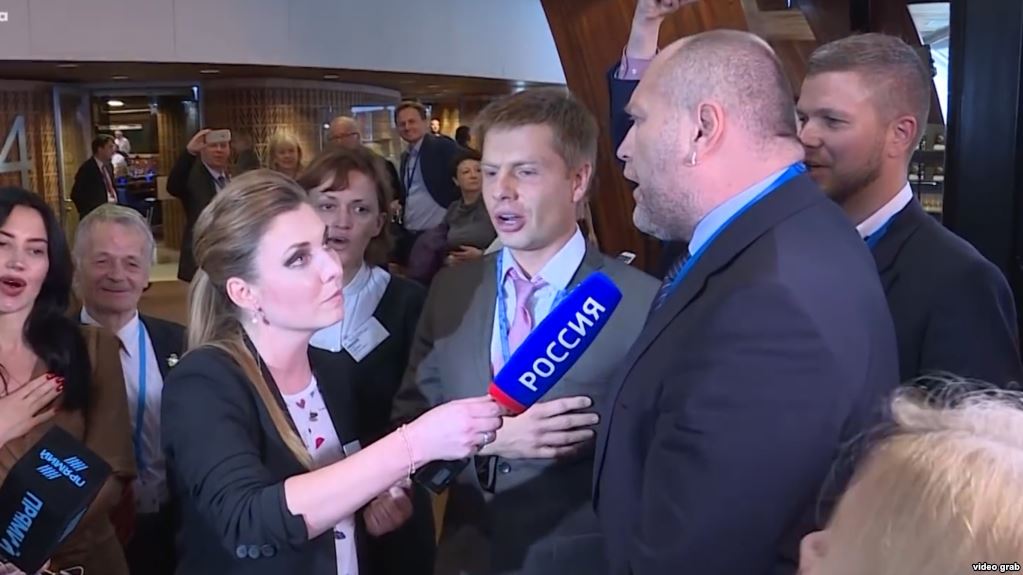
By Polygraph
“People rallied, with bloodshot eyes, pronounced these words, looking me in the eye: ‘Death to the enemy, death to Russia, death to you’.”
FALSE
Members of the Ukrainian delegation didn’t say “death to Russia” or “death to you.”
On October 9, the Parliamentary Assembly of the Council of Europe (PACE) discussed restoring Russia’s voting rights in the body, which were revoked in 2014 following Moscow’s annexation of the Crimean peninsula from Ukraine.
Ukraine’s PACE delegation proposed an amendment to the rules covering sanctions on PACE delegations, with the intention of barring a vote to restore Russia’s voting rights. Ultimately, voting on the issue was postponed.
Olga Skabeyeva, co-host of the program 60 Minutes on the Russian state-owned TV channel Rossiya-1, attempted to interview the Ukrainian delegation outside the assembly hall. Rather than seriously answer her questions, the Ukrainian delegates responded with the Ukrainian slogan “Glory to Ukraine!” and then began singing the national anthem.
This was not how Skabeyeva reported the incident on her program, however. Instead, she portrayed the Ukrainians as bullied who threatened her, saying that they shouted “Death to Russia!” and “Death to you!”
Yet in her own video clip, it is clear the delegates are not saying that. One delegate, Boryslav Bereza, at one point did use the less-popular nationalist slogan “Glory to the Nation! Death to the enemy!” Later, Bereza clearly says “Shame on the Russian Federation!” Bereza’s slogans and mannerisms, which later included a “mic drop” with the reporter’s microphone after she hands it to him. It looked as if he might have been deliberately mocking the Russian reporter.
The response to Skabeyeva is similar to the one her 60 Minutes co-host and husband Evgeny Popov received from Ukrainian President Petro Poroshenko two weeks earlier at the United Nations General Assembly. Poroshenko categorically refused to give him an interview and accused Russian state media of spreading disinformation.
Russian Disinformation Directed at Ukraine
Since the Maidan revolution of 2014, Russian state media have flooded the information space both inside and outside of Ukraine with negative propaganda, including completely fabricated stories. An analysis by the Ukrainian volunteer organization StopFake found that from March 2014 to June 2017, there were 919 fake or misleading narratives about Ukraine w published or broadcast. Most of these were produced by Russian state media outlets like Rossiya 24 (Rossiya 1’s sister channel), RT, TV Zvezda and Channel 1.
Channel 1 in particular produced one of the most infamous stories to come out of the war in eastern Ukraine, in which a woman claiming to be a refugee from the town of Slovyansk claimed to have watched Ukrainian soldiers crucify a young boyon a billboard before dragging her mother behind a tank until she was dead. StopFake later found that the same woman appeared in subsequent stories, with a completely different persona, leading some to refer to her as an “actress.”
By Polygraph





